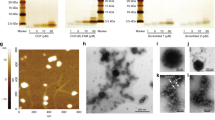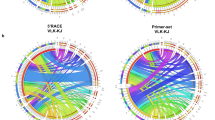Abstract
PREFERENTIAL homing of tumour cells1,2 and leukocytes3,4 to specific organs indicates that tissues carry unique marker molecules accessible to circulating cells. Organ-selective address molecules on endothelial surfaces have been identified for lymphocyte homing to various lymphoid organs and to tissues undergoing inflammation5–8, and an endothelial marker responsible for tumour homing to the lungs has also been identified9. Here we report a new approach to studying organ-selective targeting based on in vivoscreening of random peptide sequences. Peptides capable of mediating selective localization of phage to brain and kidney blood vessels were identified, and showed up to 13-fold selectivity for these organs. One of the peptides displayed by the brain-localizing phage was synthesized and shown to specifically inhibit the localization of the homologous phage into the brain. When coated onto glutaraldehyde-fixed red blood cells, the peptide caused selective localization of intravenously injected cells into the brain. These peptide sequences represent the first step towards identifying selective endothelial markers, which may be useful in targeting cells, drugs and genes into selected tissues.
This is a preview of subscription content, access via your institution
Access options
Similar content being viewed by others
References
Fidler, I. J. & Hart, I. R. Science 217, 998–1003 (1982).
Johnson, R. C. et al. Cancer Res. 51, 394–399 (1991).
Springer, T. A. Cell 76, 301–314 (1994).
Salmi, M. et al. Proc. natn. Acad. Sci. U.S.A. 89, 11436–11440 (1992).
Bevilacqua, M. P., Stengelin, S., Gimbrone, M. A. & Seed, B. Science 243, 1160–1165 (1989).
Siegelman, M. H., Rijn, M. & Weissman, I. L. Science 243, 1165–1171 (1989).
Cepek, K. L. et al. Nature 372, 190–193 (1994).
Rosen, S. D. & Bertozzi, C. R. Curr. Opin. Cell Biol. 6, 663–673 (1994).
Johnson, R. C., Zhu, D., Augustin-Voss, H. G. & Pauli, B. U. J. Cell Biol. 121, 1423–1432 (1993).
Smith, G. P. & Scott, J. K. Meth. Enzym. 217, 228–257 (1993).
Koivunen, E., Wang, B. & Ruoslahti, E. J. Cell Biol. 124, 373–380 (1994).
Koivunen, E., Wang, B., Dickinson, C. D. & Ruoslahti, E. Meth. Enzym. 245, 346–369 (1994).
Pasqualini, R., Koivunen, E. & Ruoslahti, E. J. Cell Biol. 130, 1189–1196 (1995).
Brooks, P. C. et al. Cell 79, 1157–1164 (1994).
Rak, J. W., St. Croix, B. D. & Kerbel, R. S. Anticancer Drugs 6, 3–18 (1995).
Author information
Authors and Affiliations
Rights and permissions
About this article
Cite this article
Pasqualini, R., Ruoslahti, E. Organ targeting In vivo using phage display peptide libraries. Nature 380, 364–366 (1996). https://doi.org/10.1038/380364a0
Received:
Accepted:
Issue Date:
DOI: https://doi.org/10.1038/380364a0
This article is cited by
-
In vivo therapy of osteosarcoma using anion transporters-based supramolecular drugs
Journal of Nanobiotechnology (2024)
-
Advances in functional lipid nanoparticles: from drug delivery platforms to clinical applications
3 Biotech (2024)
-
Tissue factor (coagulation factor III): a potential double-edge molecule to be targeted and re-targeted toward cancer
Biomarker Research (2023)
-
The potential of RNA-based therapy for kidney diseases
Pediatric Nephrology (2023)
-
From antimicrobial to anticancer: the pioneering works of Prof. Luiz Rodolpho Travassos on bioactive peptides
Brazilian Journal of Microbiology (2023)
Comments
By submitting a comment you agree to abide by our Terms and Community Guidelines. If you find something abusive or that does not comply with our terms or guidelines please flag it as inappropriate.



